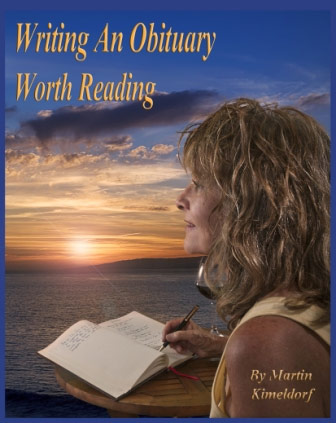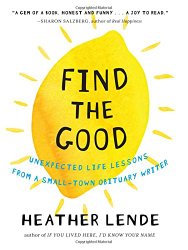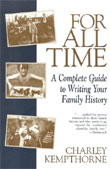Review: “The Way We Mourn”
Obituary Guide dot com, August 30, 2007
David McConkey
The article “The Way We Mourn,” in the latest issue of Maclean’s magazine, certainly has some interesting points about modern ways of observing death. Pulling no punches, writer John Fraser takes aim at what he asserts are over-the-top obituaries and funerals.
Fraser starts by noting the absence of death in most newspaper obituaries. Citing the announcements in a recent Globe and Mail, he found that only four out of 24 used the word “died.” All the others employed a euphemism. He attributes this to “the spirit of the age,” amidst the departure of traditional religious faith. With the end of “the confidence in an afterlife, the reality of death has been increasingly and perversely obscured,” he says. (Actually, euphemisms for the word “death” have been around for centuries.)
He also takes aim at many newspaper obituaries which he says are too long and “so far over the top they almost reach Pluto.” He blames these “epic sagas” both on newspapers wanting to sell more advertising space and perhaps on “the egos of surviving family members.”
He finds disturbing another trend in funerals: “self-important, self-serving eulogies.” He notes that he has attended services where the eulogists simply forgot the dead person they were supposed to remember. Instead, they “recited their own interesting journeys through life.”
Fraser laments the replacement of the traditional religious funeral with more modern approaches. His ideal is a non-personal service which would be a “moving, solemn and beautifully spiritual farewell.” He contrasts that to the “appalling eulogy” made at the funeral of Princess Diana by her “lounge lizard of a brother Earl Spencer.” Or, with what he calls the Oprah-inspired “banal, sentimental, embarrassing” attempts at 15 minutes of fame at the funerals of more ordinary people.
Fraser pays considerable attention to the deaths, funerals, and reactions to them, among Canada’s cultural elite. Names mentioned by Fraser include opera director Richard Bradshaw, tenor Michael Schade, author Christina McCall (along with her former colleague Allan Fotheringham and former husband Peter C. Newman), novelist Robertson Davies, journalist and social activist June Callwood, and television critic John Doyle. Fraser ruffles some feathers of the chattering classes. For example, he says that Doyle’s written reaction to Callwood’s death is “most cringe-making.”
Fraser sums up his thesis by saying that modern personalized funerals have resulted in the loss of a “certain decent reticence and restraint “ as well as the loss of awe in the face of death. “Death itself is largely diminished in the hoopla.”
“Our grandparents understood death so much better than we do,” Fraser says. “They understood its arbitrariness through disease, poverty and war. They understood the particular tragedy of the young dying, from any cause; they also understood the beauty of death coming after a long life well lived.”
In “The Way We Mourn,” John Fraser does make some good points. For example, there are often too many clichés and euphemisms in obituaries. As well, I also have heard eulogies that revolve around the person giving the eulogy, instead of being about the deceased. I have experienced clergy who did this, too.
Fraser, however, is off-target in his overall assessment. He certainly has the right to his own preference for a funeral, but not everyone needs to share his choice. There can be different ways to observe a death that are honest and faithful to the life of the deceased. Just because a funeral is more personal in nature does not mean it should be labeled as mere “hoopla.”
While Fraser objects to overly personal funerals, many others object to just the opposite: overly formal events that seem to be completely divorced from the life of the deceased. Instead of putting down others’ tastes, why not celebrate diversity, and empower everyone to make the choices that are appropriate for them?
A
non-conventional – as well as a traditional - marking of a
death can
still inspire a sense of awe, reverence, and wonder of living and
dying. A death is an occasion to commemorate a life, including noting
the importance of an everyday life. In fact, Maclean’s itself
does this
very effectively in its obituaries of ordinary people in the
magazine’s
regular feature, The End.
More From Obituary Guide:
- Writing Your Own Obituary Offers Chance for Reflection
- How to Write a Legacy Letter (Ethical Will)
- A Family History Writing Workshop
- Helping Families "Most Satisfying Work" for Funeral Celebrant
- Be Prepared: Will, Health Care Directive (Living Will), and More
Books You May Find of Interest:
Not Quite What I Was Planning:
Six-Word Memoirs

Writing an Obituary Worth Reading:
A Guide to Writing a Fulfilling Life Review

Find the Good:
Unexpected Life lessons From a Small-Town
Obituary Writer

Having the Last Say:
Capturing Your Legacy in One Small Story

Obit:
Inspiring Stories of Ordinary People Who Led Extraordinary Lives
For All Time:
A Complete Guide to Writing Your Family History

Thrive:
The Third Metric to Redefining Success and Creating a Life of
Well-Being, Wisdom, and Wonder

Press Ctrl + D to Bookmark this page

